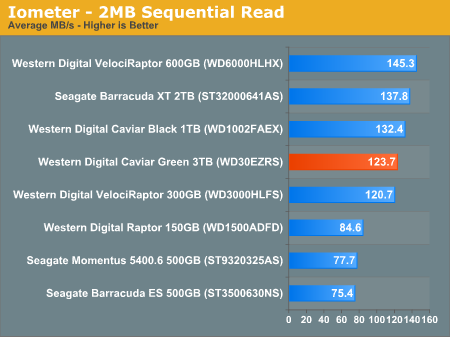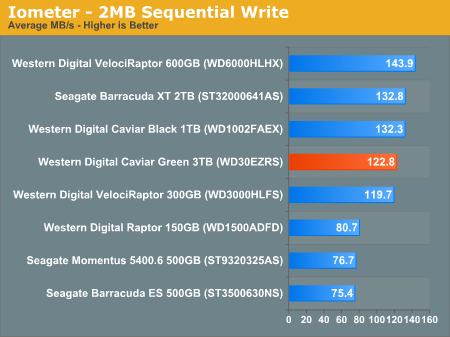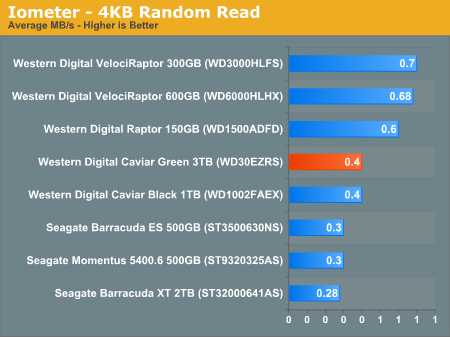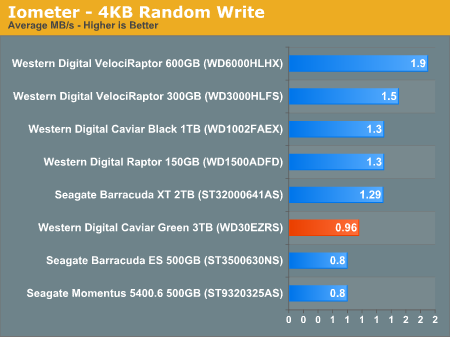Western Digital Caviar Green 3TB and My Book Essential 3TB Drives Reviewed
by Anand Lal Shimpi on October 19, 2010 1:43 PM EST- Posted in
- Storage
- HDDs
- Western Digital
- 3TB
The Test
| CPU | Intel Core i7 965 running at 3.2GHz (Turbo & EIST Disabled) |
| Motherboard: | Intel DX58SO (Intel X58) |
| Chipset: | Intel X58 + Marvell SATA 6Gbps PCIe |
| Chipset Drivers: | Intel 9.1.1.1015 + Intel IMSM 8.9 |
| Memory: | Qimonda DDR3-1333 4 x 1GB (7-7-7-20) |
| Video Card: | eVGA GeForce GTX 285 |
| Video Drivers: | NVIDIA ForceWare 190.38 64-bit |
| Desktop Resolution: | 1920 x 1200 |
| OS: | Windows 7 x64 |
Sequential Read/Write Speed
Using the latest build of Iometer I ran a 3 minute long 2MB sequential test over the entire span of the drive. The results reported are in average MB/s over the entire test length. Sequential read/write performance is very close to the older 7200RPM 1TB Caviar Black. The 3TB Caviar Green manages to come within 10% of the older 7200 RPM drive.


Random Read/Write Speed
This test writes 4KB in a completely random pattern over an 8GB space of the drive to simulate the sort of random access that you'd see on an OS drive (even this is more stressful than a normal desktop user would see). Random read performance takes place over the entire LBA span of the drive so the two numbers will be different. I perform three concurrent IOs and run the test for 3 minutes. The results reported are in average MB/s over the entire time.

Both random read and write performance is pretty reasonable for a sub-6000 RPM hard drive. You're definitely not going to be as fast as a modern day 7200 RPM drive or a 10K RPM Raptor for random opterations, but for large file storage you should be fine.











48 Comments
View All Comments
mapesdhs - Wednesday, October 20, 2010 - link
I've been buying Samsung drives for a while, they are indeed pretty quick. I've
not compared to Seagate or WD, but I've added some Samsung HDTach data to
my benchmarks page for the 1TB editions of the Spinpoint F1 and F3, if it's of
any use:
http://www.sgidepot.co.uk/diskdata.html
At some stage I'd like to start testing random read/write with IOMeter, but finding
the time is a problem.
Ian.
EddyKilowatt - Tuesday, October 19, 2010 - link
Exactly. I think the fast/high performance end of the magnetic storage market will wither pretty fast under the onslaught of SSDs, except for increasingly niche applications that need fast access to 500-1000 MB of data.Meanwhile, as SSDs get solidified in the fast boot/app/cache role, the need for speed will further be relaxed for these big TB-class drives, and disk builders will feel freer to optimize for areal density at the expense of speed. I think we'll see lots of 5400 drives, and who knows... maybe 4200 and other speeds that till now have seemed like grandma territory. Anything that can originate a couple of full-HD video streams, or other media stream of your choice, seems like it ought to be viable for what will increasingly be the foundation tier of the ever-diversifying storage hierarchy.
AFUMCBill - Tuesday, October 19, 2010 - link
"The Essential suffix somehow implies USB 3.0 support."This is incorrect. The Essential suffix means USB only support, no eSATA, no FireWire. That USB support can be either USB 2.0 or USB 3.0.
kepstin - Tuesday, October 19, 2010 - link
It's not actually true that a classic PC BIOS can't boot from a GPT formatted disk - I'm doing that right now!The design of GPT incorporates backwards compatibility, including space for an old-fashioned MBR boot sector that can be loaded with a bootloader that knows how to read GPT. As a result, Linux boots just fine on a GPT partitioned disk, even on a classic BIOS PC.
The issue is specifically that Windows can't boot off of a GPT disk without EFI, because the boot loader that Windows uses on a BIOS machine doesn't know how to read GPT partitions.
Mr Perfect - Wednesday, October 20, 2010 - link
Can it read more then 2TB? I read it to mean that BIOS couldn't handle anything bigger then 2TB, regardless.Etern205 - Wednesday, October 20, 2010 - link
On page 2 , one of the images show a MBR partition HDD can be converted to GPT.If one has all the requirements, can they just use their OS disc to directly create a GPT partition instead of doing this conversion stuff?
R3MF - Wednesday, October 20, 2010 - link
Anand - will there be 2TB green drives based on these platters?tiro_uspsss - Wednesday, October 20, 2010 - link
there is no 150GB VelociRaptor in the benches/review.. ;)mapesdhs - Wednesday, October 20, 2010 - link
Here's what I get with HDTach for my WD VR 150GB:
Max: 132.0 MB/sec
Avg: 107.0 MB/sec
Min: 79.0 MB/sec
Burst: 248.0 MB/sec
Access: 6.9ms
Ref: http://www.sgidepot.co.uk/diskdata.html
What does IOMeter use as its definition of 1MB? 10^6 bytes or 2^20 bytes? I think
HDTach uses the former.
Ian.
Mr Perfect - Wednesday, October 20, 2010 - link
I've seen a number of sites now mentioning UEFI will show up in H1 of 2011. Is UEFI an official feature of the Cougar Point chipsets?